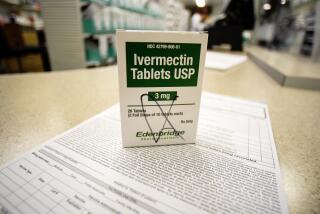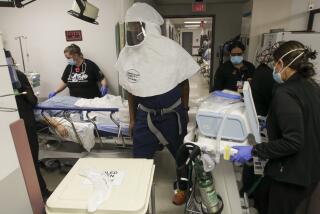Halt Surgery, HIV-Positive Doctors Urged : Health: Medical groups tell members to disclose their infection to patients. Officials say Florida dentist with AIDS likely passed on virus.
- Share via
WASHINGTON — The American Medical Assn. and the American Dental Assn. Thursday recommended that their AIDS-infected members voluntarily refrain from performing surgery or other invasive procedures on their patients or disclose to their patients that they are infected.
“The health of patients must always be the paramount concern of physicians,” said a statement issued by the AMA, which represents about 300,000 physicians in this country. The ADA represents an estimated 150,000 dentists and dental students.
The recommendation came as federal health officials released the results of their investigation of a Florida dentist with AIDS, concluding that three of his patients were likely infected in his office and that he was probably the source.
They based their conclusions on studies of the virus that determined that the strains of virus in all three patients were extremely similar to that of the dentist, but different from other viral samples obtained elsewhere in the community.
The recommendations were immediately criticized by AIDS advocacy groups and others.
Officials from the federal Centers for Disease Control said they could not determine exactly how the Florida cases occurred. They theorized that the dentist could have injured himself while operating on one or more of his patients, mingling his blood with theirs, or that he contaminated his equipment, or that a combination of factors was involved, including some that were still unknown.
“Presumably, the infection was introduced by the dentist,” said Dr. Harold Jaffe, the CDC epidemiologist in charge of the investigation. “We have to assume he brought the virus into the practice.”
Overall, CDC officials and others emphasized that the risk of such transmission was still extremely low. In fact, the Florida case is the first known instance in which a physician-to-patient transmission is believed to have occurred.
The CDC is currently debating whether to recommend that hospitals and other facilities impose new restrictions on infected health care professionals who perform surgery and other invasive procedures.
The medical organizations insisted that their new stance is based on ethical concerns and that the scientific evidence of such transmission is still unresolved.
“Until the science is clear, you have to opt on the side of patient protection,” said Dr. M. Roy Schwarz, the AMA’s senior vice president for medical education and science.
Dr. Gary Rainwater, a Dallas dentist who is speaker of the ADA’s house of delegates, agreed. “I think we’re erring on the side of caution,” he said.
But some argued that the recommendations were unnecessary and unfair.
“They are not yet scientifically justified,” said Alvin Novick, a professor of biology at Yale University who chairs the ethics committee of the American Assn. of Physicians for Human Rights.
“I believe it may be wise for some HIV-positive health providers to refrain from certain seriously invasive procedures,” Novick continued. “But the tone of this advice will almost surely lead to much more severe rules on the part of hospitals, requiring or proposing mandatory testing . . . seeking to identify persons who might be positive.”
Ruth Finkelstein, director of research for the AIDS Action Council, contended that the organizations made “an obvious public relations move. It’s a signal that going to the doctor or the dentist isn’t safe. And it’s a signal to medical providers that treating people with HIV isn’t safe either. Both those signals are inappropriate based on the data.”
Novick predicted that HIV-infected health professionals would not comply with the suggested policies.
“It’s unthinkable that anyone would choose to disclose their HIV status to patients,” he said. “It would be equivalent to retirement. Surely it would be better to retire than be subject to the heavy-duty discrimination that disclosure will lead to.”
More to Read
Sign up for Essential California
The most important California stories and recommendations in your inbox every morning.
You may occasionally receive promotional content from the Los Angeles Times.










